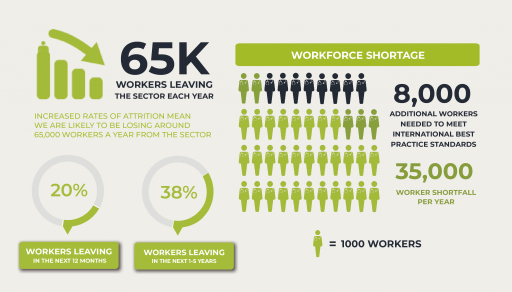
The Nursing Shortage Survival Guide: 7 Strategies to Attract and Retain Top Nursing Talent
Understanding the Challenges
The nursing shortage, a critical issue in the healthcare industry, is not just a matter of numbers. It's a challenge that directly impacts patient care. Driven by factors like an aging workforce, high burnout rates, and limited entry opportunities for new nurses, this shortage strains healthcare systems, impeding their ability to meet the growing needs of an aging population. High turnover rates, challenging work conditions, and limited nursing education programs exacerbate the problem, threatening patient safety and care quality.
A multifaceted approach is essential to addressing this crisis. Effective strategies include:
Promoting work-life balance.
Offering competitive compensation.
Recognising and rewarding nurses.
Leveraging technology.

By implementing these strategies, healthcare organisations can combat the nursing shortage, ensuring quality patient care and a thriving nursing workforce. This effort requires sustained commitment from all stakeholders, promising a robust future for healthcare with a healthier nursing workforce.
Creating an Attractive Work Environment
As healthcare administrators and HR professionals, your role in creating an attractive work environment is crucial. It's not just about preventing burnout and job dissatisfaction but about fostering a culture that values and supports nursing talent. Implementing strategies that cultivate a positive workplace culture and accommodate diverse needs and preferences can significantly enhance job satisfaction and retention rates.
Importance of Work-Life Balance:

Nursing, a demanding profession requiring long hours and irregular shifts, must focus on work-life balance to prevent burnout and enhance job satisfaction. According to Seek Australia's recent candidate insight page, "Laws of Attraction," work-life balance is the top driver for healthcare candidates. Based on a survey of 1,744 respondents from a total of 14,717 candidates, the top five must-have factors are:
Ability to work part-time
Additional leave
Time in lieu
Flexible working hours
Ability to buy annual leave/take unpaid leave
Healthcare facilities can leverage these insights to tailor their attraction strategies, ensuring they meet nursing professional's critical needs and preferences. Organisations should offer flexible scheduling options, such as self-scheduling, job sharing, or part-time opportunities, to accommodate personal and family needs.
Strategies to Promote a Positive Workplace Culture:
A positive workplace culture fosters community, collaboration, and support among nursing staff. Organisations can promote a positive culture by encouraging open communication, providing opportunities for team-building activities, and fostering an environment of mutual respect and recognition. Regular feedback mechanisms, such as employee surveys or focus groups, can help identify areas for improvement and ensure that nurses' voices are heard.
Accommodating Diverse Needs and Preferences:
Nursing professionals come from diverse backgrounds and have varying needs and preferences. Organisations should strive to create an inclusive environment that accommodates these differences, implementing strategies that include offering resources for continuing education, supporting professional development opportunities, and providing access to employee assistance programs or mental health resources. Additionally, organisations should ensure that their policies and practices are inclusive and respectful of different cultures, religions, and lifestyles.
By prioritising these strategies, healthcare organisations can create a supportive and engaging work environment, attract and retain the best nursing talent, and ensure high-quality patient care.
Competitive Compensation and Benefits

Offering competitive compensation and benefits is crucial for attracting and retaining top nursing talent. According to Seek Salary information, registered nurses in Australia earn an average annual salary of around $85-95K. However, top-performing healthcare organisations go above and beyond to remain competitive in the job market. Seek's "Laws of Attraction" data shows that salary and compensation is the second biggest drivers for candidates. The top five must-have factors for healthcare candidates regarding compensation and salary are:
Paid Overtime
Hourly Rate
Base Salary
Commitment to Gender-Pay Equity
Salary Review Period
Healthcare facilities can leverage these insights to tailor their attraction strategies, ensuring they meet nursing professionals' key needs and preferences. Creative compensation models, such as sign-on bonuses, loan repayment assistance, and other financial incentives, can help organisations stand out and demonstrate their commitment to their nursing staff. Additionally, many nurses value benefits such as comprehensive healthcare coverage, retirement plans, and tuition reimbursement programs.
Understanding the specific benefits that matter most to nurses in your area is essential. Facilities can gain valuable insights into candidate priorities by conducting surveys, focus groups, or one-on-one interviews with current and prospective nurses. Tailoring your benefits package to meet these needs can significantly improve your ability to attract and retain top talent.
Effective Recruitment Strategies
Crafting Job Descriptions:
Compelling job descriptions and a strong employer brand are crucial for attracting top nursing talent. Job postings should provide clear and detailed information about the role, responsibilities, qualifications, and work environment. They should also highlight the organisation's values, culture, and commitment to supporting nurses' professional growth and work-life balance.
Expanding the Reach of Your Advertisements:
Leveraging digital marketing and social media can significantly expand the reach of job postings and enhance the organisation's visibility among potential candidates. Platforms like LinkedIn, Facebook, and Twitter can be used to share job openings, promote the facilities brand and engage with the nursing community. Partnering with nursing influencers or creating targeted advertising campaigns can reach a wider audience. Additionally, utilising nursing-specific job boards and publications is essential for attracting qualified candidates.

Partnering with Educational Institutions:
Partnering with nursing schools and educators is a crucial strategy for organisations seeking to attract top nursing talent. Building relationships with local nursing programs can provide early access to promising students and recent graduates. This can be achieved through guest lectures, career fairs, and offering internship or residency opportunities. Organisations can showcase their commitment to professional development and nurture relationships with prospective candidates by actively engaging with the academic community.
Nurse Residency and Internship Programs:
Nurse residency and internship programs offer structured training and support for new graduates, easing their transition into professional practice. Providing a supportive environment and hands-on experience demonstrates the organisation's dedication to nurturing the next generation of nurses. Successful residency programs improve retention rates and foster a sense of loyalty and commitment among participants.
Nurturing Prospective Candidates:
Maintaining relationships with prospective candidates is essential throughout the recruitment process. Effective communication, responsiveness, and transparency create a positive impression and build trust. Organisations should strive to provide a seamless candidate experience, from initial outreach to onboarding. Regular check-ins, personalised follow-ups, and clear expectations help maintain engagement and demonstrate the organisation's commitment to its potential hires.
Promoting Career Development and Continuous Learning

Providing opportunities for career advancement and continuous learning is crucial for retaining top nursing talent. Nurses value personal and professional growth, and organisations investing in their development foster a loyal and engaged workforce.
Establish clear career pathways that outline the steps for advancing to higher positions, such as nurse manager, clinical nurse specialist, or nurse educator roles.
Offer structured training programs, workshops, and certifications to help nurses expand their skills and stay current with industry best practices.
Mentorship Programs:
Mentorship programs pair experienced nurses with those seeking guidance and leadership development opportunities. This facilitates knowledge transfer and fosters a culture of continuous learning and collaboration.
Leadership Development Programs:
Leadership development programs are essential for cultivating future nurse leaders within the organisation. Identify high-potential nurses and provide them with specialised training in conflict resolution, change management, team building, and strategic decision-making. These programs help nurses develop the necessary skills to take on leadership roles and contribute to the organisation's long-term success.
Implementing Effective Recognition and Reward Systems
Recognising and rewarding nurses for their hard work and dedication is crucial for fostering a positive work environment and boosting morale. An effective recognition and reward system helps retain top nursing talent and cultivates a sense of appreciation and value within the organisation.

Celebrating Achievements and Milestones:
Acknowledging nurses' contributions through recognising years of service, exceptional patient care, or successful completion of certifications or training programs is powerful. Public recognition events, such as award ceremonies or employee appreciation days, celebrate these accomplishments and express gratitude for the nurses' commitment.
Ongoing Recognition:
Incorporate ongoing recognition into the workplace culture by encouraging managers and leaders to acknowledge and praise nurses for their hard work, whether through verbal appreciation, handwritten notes, or small tokens of gratitude. Consistent recognition can foster a sense of belonging and appreciation, motivating nurses to continue delivering exceptional care.
Creative Non-Monetary Incentives:
Creative non-monetary incentives, such as professional development opportunities, flexible scheduling options, additional paid time off, or job shadowing in specialised areas, can effectively recognise and retain top nursing talent.
Peer Recognition:
Fostering a culture of peer recognition can be incredibly powerful. Encourage nurses to acknowledge and appreciate each other's efforts, fostering a supportive and collaborative environment. Aged Care facilities can facilitate this environment through formal peer recognition programs or promote a culture of gratitude and appreciation among colleagues.
Leveraging Technology

Technology is pivotal in streamlining recruitment processes, enhancing training initiatives, and gathering valuable data to inform retention strategies. By embracing digital tools and data-driven decision-making, healthcare organisations can gain a competitive edge in attracting and retaining top nursing talent.
Utilising Technology in Recruitment and Training:
Leveraging technology in recruitment and training can significantly improve efficiency and reach. Utilise applicant tracking systems (ATS) to manage job postings, screen resumes, and streamline the hiring process. Online assessments and virtual interviews help identify the most qualified candidates, reducing the time and costs of in-person interviews. E-learning platforms and virtual training modules provide nurses with flexible and accessible opportunities for professional development. Interactive simulations and online courses ensure nurses stay up-to-date with the latest best practices and industry standards.
Implementing Feedback Loops for Continuous Improvement:
Collecting and analysing feedback from nurses is crucial for identifying areas for improvement and implementing effective retention strategies. Survey tools and feedback platforms gather insights on job satisfaction, work-life balance, professional development opportunities, and overall workplace experience. Analysing this feedback data pinpoints potential issues or areas of concern and takes proactive measures to address them. This continuous feedback loop fosters an environment of open communication and demonstrates a commitment to supporting and retaining nursing staff.
Data-Driven Decision-Making for Retention Strategies:
Leveraging data analytics provides valuable insights into nursing staff retention patterns and trends. By analysing data on turnover rates, exit interviews, and employee engagement metrics, organisations can identify factors contributing to nurse attrition and develop targeted retention strategies. Predictive analytics can forecast potential turnover risks, allowing organisations to take preventive measures and implement targeted interventions. Data-driven decisions enable healthcare organisations to allocate resources more effectively, prioritise retention initiatives, and ultimately create a more stable and satisfied nursing workforce.
Benefits of Partnering with Healthcare Staffing Experts
Partnering with a specialised healthcare staffing firm like Austcorp Executive offers numerous benefits to organisations seeking to attract and retain top nursing talent. By leveraging their industry expertise and extensive talent networks, healthcare staffing experts streamline recruitment and provide access to a broader pool of qualified candidates.

Access to Specialised Talent Pool:
AustCorp Aged Care maintains extensive databases of pre-screened and qualified nursing professionals, allowing organisations to quickly identify and connect with candidates who meet their specific requirements. This targeted approach saves valuable time and resources compared to traditional recruitment methods.
Outsourcing Recruitment and Credentialing:
Outsourcing recruitment and credentialing processes to staffing experts can significantly reduce the administrative burden on healthcare organisations. AustCorp Aged Care manages background checks, license verifications, and skills assessments, ensuring that only the most qualified candidates are presented. Embedded in AustCorp Aged Care contract solutions, we offer above-award weekly remuneration for all contractors—metro and regional—as well as accommodation and travel for regional contractors. Our management of work-away contracts ensures that regional facilities benefit from a continuous influx of skilled talent, taking logistical complications and staffing stresses away from the site.
Staying Up-to-Date with Industry Trends:
AustCorp Aged Care stays up-to-date with industry trends, compensation benchmarks, and best practices in recruitment and retention. We provide valuable insights and guidance, helping organisations craft competitive compensation packages, develop effective retention strategies, and create an attractive work environment that appeals to top nursing talent.
Are you interested in learning more? Visit the AustCorp Aged Care page to discover how AustCorp Aged Care can help you attract and retain exceptional nursing talent.
Ready to Elevate Your Aged Care Team?
Contact us now for a confidential conversation and discover how our specialised services can enhance your recruitment efforts..
